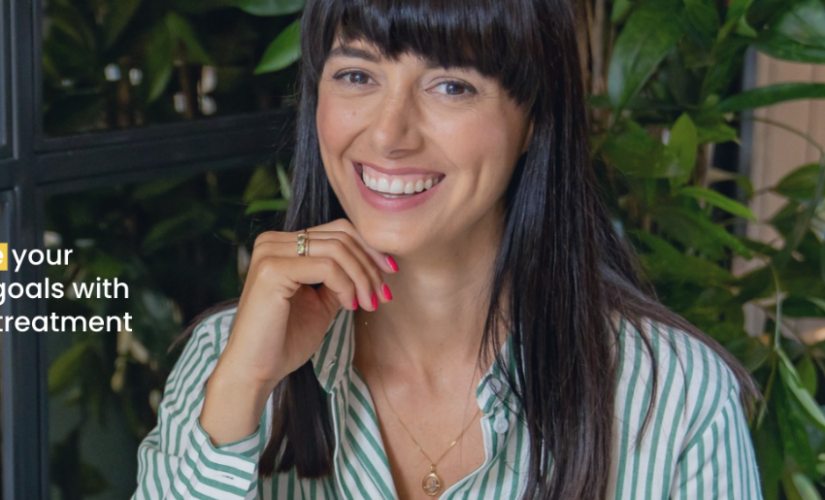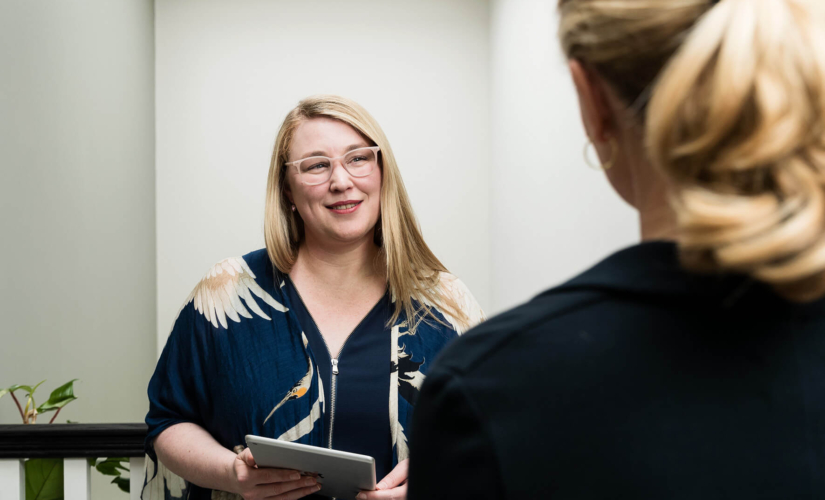How to support your partner or friend through IVF
IVF can be a demanding journey, physically, emotionally, and mentally. And while one partner may carry the physical burden, it’s something you go through together.
I’m Amy, Head of Marketing here at The Evewell, and an ex-IVF patient. We went through six rounds of IVF over several years. We’re incredibly lucky to have two lovely little girls as a result, but the journey put significant pressure on our relationship (and friendships) along the way.
If you’re wondering how to support a partner or friend going through IVF, I wrote this guide to help show that your presence, patience and understanding can make a real difference. I hope this guide offers simple, meaningful ways to be there for someone you love, every step of the way.
Understand what IVF is (and isn’t)
You don’t need to be a medical expert to support your partner or friend, but understanding the basics of what they’re going through can help you be more empathetic and prepared.
IVF (in vitro fertilisation) involves a series of steps that can be physically and emotionally intense. Hormone injections, frequent scans, egg collection, embryo transfer and the dreaded two-week wait can all take their toll, not just physically, but mentally too.
It’s also important to know that IVF isn’t always straightforward. Success isn’t guaranteed, and the process can come with uncertainty, disappointment, and emotional highs and lows for both of you. Recognising this and being there through the ups and downs can be one of the most powerful ways to show your support.
How can IVF affect relationships?
IVF can bring couples closer, but it can also highlight differences in how each person copes with stress, disappointment, or uncertainty. Hormonal changes, time pressures, and the emotional weight of treatment can sometimes lead to tension or misunderstandings.
It’s common for one partner to feel more hopeful while the other feels anxious, or to want to talk often while the other prefers silence. These differences aren’t signs of failure; they’re natural responses to a complex process.
The key is honest, ongoing communication. Check in with each other regularly and make space for both feelings, even when difficult. Remember, you’re both navigating something emotionally intense, but you’re doing it together.
The importance of being emotionally present
While you may not be the one going through treatment physically, IVF can still bring up a lot of emotion for both of you. One of the most important things you can do is to be there simply.
You don’t need the perfect words or to know exactly what to say. Being emotionally present – even when you don’t know what to say – can mean more than saying the “right” thing. Sometimes, listening without trying to fix, holding space for tears or frustration, or just offering a quiet moment of comfort is enough.
Let your partner know you’re with them, whether by checking in regularly, validating their feelings, or just sitting beside them during appointments. Small, consistent moments of connection can offer deep reassurance during what can be a very uncertain time.
10 practical ways to share the IVF load
IVF can feel overwhelming, especially for the partner undergoing treatment. While the physical burden may fall mostly on one person, there are many ways you can share responsibility – emotionally, practically, and mentally – to lighten the load and strengthen your bond.
Here are some meaningful ways to support your partner through this journey:
- Learn the details of the treatment process together. Taking time to understand procedures, medications, and timelines helps reduce uncertainty and shows you’re in this side by side. When possible, attend appointments and ask questions together.
- Help with logistics. Managing appointment bookings, calendar reminders, clinic correspondence, and medication schedules can help ease mental strain and show your partner you care.
- Help with injections or medications, if your partner is comfortable. Your involvement can be a reassuring reminder that you’re sharing the journey.
- Create a calm, stress-free home environment. Practical support often speaks louder than anything else, whether it’s cooking, running errands, or managing daily tasks.
- Support healthy lifestyle choices. Join them in eating nourishing meals, reducing alcohol or caffeine, and making time for gentle exercise like yoga or meditation.
- Protect emotional boundaries. Everyone processes IVF differently. Check in with your partner about whether they want to talk or prefer a distraction, and respect their needs in the moment.
- Be mindful of social situations and triggers. Work together to prepare for family questions or social events, and have an exit plan if things feel overwhelming.
- Encourage self-care without guilt. Supporting your partner to take time for hobbies, rest, mindfulness, or gentle exercise helps balance the emotional rollercoaster.
- Find ways to enjoy each other’s company. Making time for lighthearted moments – watching a show, playing a game, or going for a walk – strengthens your connection beyond IVF.
- Celebrate small wins together. Every step forward matters, from completing a treatment cycle to simply getting through a tough day. Acknowledging progress builds resilience and hope.
Ultimately, sharing the load isn’t just about ticking things off a to-do list. It’s about showing up, staying engaged, and making your partner feel supported, emotionally and practically, throughout the process.
Communication and intimacy during IVF
IVF can put a strain on communication and intimacy, but it’s also an opportunity to strengthen your connection. Hormonal changes, stress, and medical appointments might affect your partner’s mood, energy, or libido, and that’s completely normal.
Keep the lines of communication open by regularly checking in with each other. Ask gentle questions like, “How are you feeling today?” or “Is there something you’d like to talk about?” Remember, intimacy isn’t only physical; emotional closeness counts just as much.
Be patient and flexible, sometimes your partner might need space, while other times they may want extra reassurance. Small gestures, like holding hands or a comforting hug, can make a big difference.
The impact of fertility treatment on friendships
It’s also important to acknowledge how IVF can affect friendships. For me, one of the hardest parts of the journey was watching friends get pregnant easily – sometimes the first time, sometimes again, while we were still waiting and hoping.
I wanted to be happy for them, and often I was – but underneath, it could feel excruciating and isolating. You might find yourself drifting from friends who don’t quite understand what you’re going through, or feeling left behind when everyone else seems to be moving on with their lives. These emotions are valid, and they don’t make you a bad friend. They simply reflect the depth of what you’re carrying.
Navigating Friendships During IVF: Practical Tips
Be honest about your boundaries. It’s okay to step back from certain social situations, especially if pregnancy announcements or baby showers feel too painful. Protecting your emotional space isn’t selfish – it’s self-preservation. Let close friends know gently if you need some distance, and trust that true friends will understand.
Choose who you confide in. You don’t have to share every detail of your IVF journey with everyone. Instead, choose one or two people who feel emotionally safe – those who listen without offering solutions, and who validate rather than minimise your feelings.
Create a supportive circle. If friends around you are getting pregnant easily or saying the wrong things (even with good intentions), it may help to connect with others who truly get it. Online forums, fertility support groups or counselling can provide a space where you feel seen and understood.
Celebrate others in your own time. If a friend shares pregnancy news, it’s okay to feel happy for them and sad for yourself at the same time. If you need time to process, respond later – when it feels more manageable. Send a kind message that acknowledges their news while also honouring your own feelings.
Keep communication open when you can. Some friends may not know how to support you and may unintentionally go quiet. If you feel able, share a little about what you’re going through and what kind of support you need – even if it’s just a message that says, “I’m going through a tough time right now. I appreciate you being here, even if I don’t always reply.”
IVF and LGBTQ+ couples: additional considerations
IVF journeys for LGBTQ+ couples can include unique challenges alongside the usual physical and emotional demands. Legal questions around parental rights, decisions about who carries, and navigating systems that may not always feel inclusive can add extra layers of stress. On top of that, it’s normal to experience resentment, jealousy, or disconnection at times — feelings that don’t mean you’re failing, just that you’re human.
Communication becomes especially important. Being open about expectations, worries, and emotions — even the uncomfortable ones — can make a huge difference. Sharing the load might mean attending scans together, taking turns with injections, managing paperwork, or simply checking in daily to ask “how are you, really?”. Equal doesn’t always mean identical, but finding a rhythm that feels fair to both partners matters.
It’s also important to acknowledge that relationships and friendships may shift during treatment. Protecting your energy, leaning on community support, and giving yourself permission to step back when needed can help. And if you’re not the partner undergoing treatment, your role is still vital — whether that’s offering practical help, emotional support, or simply being present.
It’s also key to work with fertility clinics experienced in LGBTQ+ care, who respect your family structure and can guide you through legal and medical steps. At The Evewell, our inclusive and welcoming clinics have been designed to help the LGBTQ+ community build their own families. Contact us to find out how we can help.
When things don’t go to plan
IVF is a hopeful journey, but it can also come with unexpected challenges. Sometimes a treatment cycle may be cancelled if the body doesn’t respond as hoped to the medication used to stimulate egg development. In other cases, embryos might not develop as expected, or fewer good-quality embryos are created than hoped.
There may be times when an embryo transfer needs to be postponed or delayed, and of course, a negative pregnancy test or early miscarriage can bring deep sadness and disappointment. For many couples, emotional fatigue can build up after repeated cycles or ongoing uncertainty about what comes next.
These setbacks are difficult for both partners. In these moments, you offer steady support without trying to fix things. Listen openly, acknowledge the pain and frustration, and remind your partner (and yourself) that these experiences don’t define your journey or hope.
If the emotional weight feels too heavy, seeking professional support through counselling or support groups can provide a safe space to process feelings and strengthen your partnership.
Final thoughts: you’re not alone
IVF is a journey that’s filled with highs and lows, but you don’t have to face it alone. By showing up with patience, empathy, and practical support, you’re making a powerful difference to your partner’s experience.
Every couple’s path is unique, and it’s okay to feel uncertain or overwhelmed at times. Remember, seeking help and leaning on others is a sign of strength, not weakness.
At The Evewell, we’re here to provide expert advice and guidance tailored to your fertility journey. If you have questions or need support at any stage, don’t hesitate to get in touch with our team.





